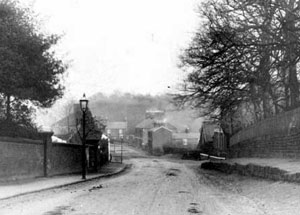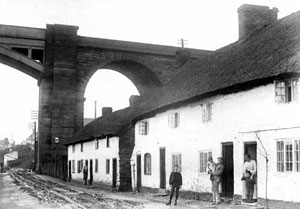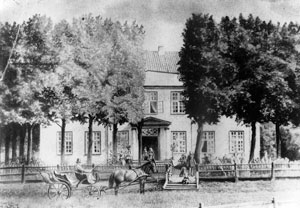 The Journal of PETER PICKERING of Norley
The Journal of PETER PICKERING of Norley
Peter Pickering, Esq (1785-1877)
was the youngest son of the very wealthy and famous merchant family of England (OURS!). He traveled to Danzig, Prussia to learn his family’s business and where he met and married Emilie Henriette Wilhelmine Steffens. Emilie’s sister, Frederica Carolina Mary Steffens also married Peter’s brother, William Pickering (my 3x Great Grandfather ).
I think of this remarkable journal as the “crown jewel” of our ancestry story. It is owned by the family of my German-born fifth-cousin, Mr. Alfhard Kowallek (now deceased) as it was handed down through the family to him. He is a direct descendant of Peter and Emilie Pickering. Through Alfhard’s generosity of spirit and time, this totally incredible life story of one our family members in the 1700 and 1800’s unfolds. I have transcribed all the pages including the quaint spelling and strange punctuation.
Peter’s story begins …
At the time that I was born the 23rd of August 1785, my Parents John and Mary Pickering, lived at Bridge Hous one mile from Frodsham in Cheshire but, as I was the youngest Child of my Parents viz, seven Sons and four Daughters, and my oldest Brother Thomas, having been born the 23rd August 1765, he was exactly twenty years older than I was, and old enough to establish himself;
“My Father resolved to Rent a Manufactory; the largest of its kind in Great Britain; which was then being in the process of being built; but the Dwelling Hous of said Manufactory, not yet habitable; my Parents were obliged to live in the Ware House of said Manufactory until such time, as the Dwelling Hous became habitable; and, consiquently I was born in said Warehouse; and as my Father was the first and original Renter of said Manufactory; so; it remains rented in my Parents Family up to the present period from the time it was built.
Abt. 1790 (age 5)
“From that time I can remember nothing of consiquence until 1790 when my Fathers older Brother and Sister, visited my Parents at Frodsham Bridge; which caused much sensation, as my Uncle kept his Hunters, and generally attended the Cheshire Fox Hounds and Harriors; he being a very gay Character and having through his expensive habits of life ruined himself and the younger branches of my Father and his two Sisters.
“During the visit of my Uncle and Aunt at Frodsham Bridge, I was one day missing a long time; but at last found in a necessary occupation by my Mother, doing what I ought not to have done and for which I was very severly beaten by my Parents, in presence of my Uncle and Aunt which is probably the cause of my remembering so well their visit and its consiquences.
Abt. 1795 (age 10)
“From the above mentioned time another five years passed; during which time I attended pretty regularly the public School at Frodsham; and in passing to said School, and venturing home again, I was allmost allways the leader of my playmates, in all kinds of agility, swiming, runing, jumping; and all descriptions of mischief; so that I got the buy name of Ring Pickering, among the Boys and the whole Neighborhood.
“At this time 1795 my Brother James, was taken Ill, in consiquence of which Dr. Hulley of Frodsham was called in, to attending Brother; who however died one Sunday, and when Dieing, five hundred Hussors [ed. soldiers] passed over Frodsham Bridge, in front of our Hous, which at that time was such an unsual occurrence, that it appears to me now as if it took place a few days or months ago.
“When Dr. Hulley visited my Brother in his . . . ., he sometimes brought his Daughter with him, on her pony as she wrode beautifully; so that I made her acquaintance; and being of the same age allmost to a day; and interest and mutual affection was soon the consiquence of the same.
“I mention the above mutual affection, because that affection has been the ruling influence of all my actions from that time 1795 till I married in 1818. but; that I did not marry Miss Hulley (my then public betrothed Bride) was not in the change of my affections; on the contrary, Miss Hulley wished wed, proposed that we should immediately be married, and live in Chambre Garnie, before the return of my Brother William from Danzig; as she feared his influence, over my projected matrimony with herself; I, however being aware, and seeing the danger of such a decided and premature step to her own and my future existence; because we had no means of subsisting without his approving our determination, which he consistantly could not do, as we in that case, and at that time, could only support a Family, and its attending expences through his means and assistance.
“I was therefore obliged not to agree with this proposition, and the consiquence thereof was, Miss Hully was so much hurt and offended, that after she had proposed, to be immediately married and I objected to comply therewith as I expected my Brothers return from Danzig in a few days; Miss Hulley without siremoney or explination in a few days afterwards returned to me the trifling presents, which I, as her betrothed had given her, with the declared resolve; she considered our connection as betrothed as entirely another and dissolved.
Abt. 1817 (age 32)
“A few weeks after this had taken place, my Brother returned from Danzig to Liverpool; and after having asked me, how I stood with Miss Hulley and I have explained the same to him; he said its well, and he rejoced it had been so; as he was authorized by Miss Emilie Steffens and her Parents to inform me if my wishes remained as the formerly were; there would now be no longer any difficulty made to our Union on my arrival in Danzig; as then our Nuptuals mine and Miss Emilie Steffens could take place, on the same Day as nthe Nuptuals, of the younger Daughter of Mr. Steffens with F…… Colonell von Kamecke the Commandant of Danzig which was the wish of the Bride of Collonel von Kamecke Commandant of Danzig
“In consiquence of this communication from Miss Steffens and her Parents, I immediately, departed from Liverpool and arrived in Danzig about the 1st March 1818 and was married to Miss Emilie Steffens on the 18th of April 1818
Abt. 1799 (age 14)
“I must here however return with my narrative to the year 1799 as at that time my two oldest Brothers Thomas and Samuel Pickering, having resolved to make very considerable purchases of Wheat in Danzig, they sent my Brother William, out to Danzig to make said purchases, on their account and at the request of my Brother William and with the consent of my Parents, I, a boy of 14 years old accompanied my Brother, first to learn the Germain Language, and then to be placed in some Merchants Counting House to learn Mercantile routine.
“We travelled through Hull and arrived at Danzig the 1st of November 1799, and immediately procured board and Lodging, with the Reverend Clergyman Duisburg in the Long Market but three months later we changed our residence, and engaged for Board and Lodging in the Hous of an Englishman and his Family of the names of Wilkinson
“In consiquence of my Brother having to make such very considerable purchases of Wheat in Danzig, we were immediately invited and introduced into all the first and most respectable Familys in Danzig; and as I, at that time had an unusual good voice, I was allways requested to sing, the few English Ballads and Airs which I knew, as also to Dance with the handsomest young Ladies and their Mothers, I being then only fourteen years old; as the accomplishment of beautifull Dancing, had been very much neglected in Danzig prior to the French Troops having taken possession of Danzig
“About the time we arrived in Danzig, a youth of my own age James Sherlock of Liverpool, arrived also at Danzig, and was placed in the Office of . . . . Muhl, to be instructed in all the minutio of Mercantile Affairs, as also another young man of my own age John Sowden from Leeds, arrived at Danzig, and was placed in the Counting Hous of Toenniges and Konipatzki, as the nephew of Mr. George Toenniges had brought young Sowden, from his Parents in Leeds with that intention; as Sowdens Father in Leeds was intimately connected with the Uncle of young George Sonnigs, under the Firm of George Toenniges and Konipatzki which was one of the wealthyest and most respectable Mercantile establishments in Danzig
“Young George Toenniges had an Aunt Sister to his Uncle who was also married to one Mr. Schwartz, who was also a very respecatble Merchant, with one Son and two beautiful Daughters a little older than myself; this Mr. Schwartz invited every month about full moon time; in Winter at their Town Hous, and in Summer at their Country Hous in Ohra; about twenty young Ladys, and youths, to Dance and Supper; for the whole time that I remained in Danzig
“One of these Ladys the Daughter of Theodocious Frankziers, by his first Wife (a very beautifull young lady of my own age; her Parents, (each) at that time extremely rich) in consiquence of our meeting so often, and with certenty every month, independant of cassual meetings, and our dancing together a kind of reciprocal Feeling, more interesting than common acquaintance sprung up, between us, unconscious on my part; as my affections for Miss Hulley had not abated in the least, so that I really never swerved from that attachment, and never made any possitive assertions, or advances to Miss Frankziers; as that would have been derogative to all principles of honour on my part, as matters then stood.
“During the Winter of 1799 or 1800 it so happened that Jerome Bounaparte on his return from St. Petersburgs Court passed through Danzig, and during his stay in Danzig, was out of respect to his Brother, Napoleon Bounaparte; at that time the first Counsul in France, was invited by the Majestry of Danzig to attend or be present at a Public assembly, in the dreng Mohren Holz Garssn and during the Evening said Jerome Bounoparte, danced a Scotsch Reel with the various Englishmen present, one of which was my Brother William, I, and the company standing by and looking at them.
“At the time I now am speaking of, Mr Robert Gladstones arrived at Danzig, as the traveling Partner of John and Robert Gladstone in Liverpool and who was particularly acquainted with Mr. Edward Pickering of the Firm of Edward and Robert Pickering of Liverpool, and distant relations of our Family, and to whom Mr. Edie Pickering; my foster relation introduced me, and in the course of conversation, expressed the wish, that on his, Mr. Gladstones and my return to Liverpool, they. John Robert Gladstons should take me into their Counting hous for five years; as thereby I should be enabled when of age, to vote for representative in Parliament in my own right; in which arrangement later, there was no difficulty; as my oldest Brother, was particularly acquainted with Mr. Gladstone; Father to the present William Edward Gladstone Chancelor of the Exchequer in the present Administration in London; and this Introduction had the consiquence in later years; of my correspondence with the English Government, and Board of Admiralty; with all its consiquences
Abt. 1802 (age 16)
“In the year 1802 May 10th my Brother William was recalled to England, and to bring me also back, and soon after our arrival I was placed for five years in the Counting Hous of John and Robert Gladstone; the youngest of six Clerks, in said Counting Hous in which situation I remained for four years without any advancement in said Counting hous.
“When the Election of Mr. George Canning and Mr. Henry Brougham; as rival Candidates for the representatives of Liverpool in the House of Commons, took place: and as Mr. Canning was invited by Mr. John Gladstone, and his Mr Gladstones Friends, Mr. Canning took up his abode at the particular request of Mr. Gladstone at Mr. John Gladstones house in Rodney Street; and I was deputed by Mr. Gladstone to be also in his Hous, for the purpose of copying written communications between Mr. Canning and Mr. Brougham, during the time of the elections; so that I very often came into personal communication with both Mr. Canning and Mr. Brougham during the time of the whole Election
“A little before the time that I was taken into the Counting hous of Messrs John and Robert Gladsontes, Mr. John Gladstone was married to Miss Robertsen; and as I had the youngest department in the office I was allmost Dayle communication with Mrs. John Gladstone; and I a boy of 16 years old soon became a favorite with Mrs. Gladstone
Abt. 1806 (age 20)
“The young man who had the situation before me, was Wilsen Ledger the son of a Whitehaven Banker an intimate Friend and Mercantile connection of Messrs John and Robert Gladstone so that I had often the opportunity to see how he was favored to my disadvantage which hurt me so very much that I became perhaps careless of doing my Duty, and seeing there was no probability of any other young Man being taken into the Office during my apprentice Ship I, with the consent of Messrs Gladstones, as also my Parents seperated from Messrs Gladstones, and then with the consent of my Parents and advice of my Brother William I immediately took a passage in the Ship Majestrate, bound from Liverpool to New York; with the intention of forming a Mercantile Establishment with my Brother John in Philadelphia who had left Frodsham and sailed to Philadelphia the year before [abt. 1805], with the intention that his Wife should follow him later with their Family of Children after he had established himself as Commission Corn and General Merchant in Philadelphia;
“and allthough at that time, the exportation of Gold was prohibited out of England under pain of Death I still resolved to take with me thirty Gold Guineas with me, bound round, or rather under the Calf of my Leg and betwixt and between my ancle in my Boots, to prevent their being seen or found out, which succeeded as I wished; as the profit on the Gold in Exchange nearly paid my passage money, and I thereby and therein had an overplus of [17 pounds, 10pence] in New York to defray immediate outlays
“When we sailed from Liverpool in the Majestrate, and had cleared the Irish Chanel, the Wind was so boisterous and unfavorable that we were forced into the Bay of Biscay and had difficulty to hold our own opposite Boundeaux, which we saw dimly, allways taking, taking and taking upwards of fourteen Days, betwixt and Cape Finister, and as we at last was able to leave the Bay of Biscay, we had again to tak, and tak to be able to weather the Irish Coast at Ballydonaahaan Bay; and so we were obliged to hold on, the same course to clear the whole Irish Coast, till about the 65th degree N Lattitude and from there we were forced to tak against head Winds, till we passed the New Foundland Bank; were we experienced such heavy Thunder and Lightening, as I never before experienced; and so we were obliged to continue to tak past the Azors; and the first Land we made in America was Cape Hatteras, about the entrance to Chesapeak, and from there we continued to work against head Winds till we arrived at the entrance of Sandy Hook about 4 oclock AM so that we could hear the Sandy Hook breakers, and saw a Brig passing into Sandy Hook Bay, it was so very hazy and unclear and stormy that the Captain would not run the risk, without a Pilot to enter, and consiquently passed Sandy Hook and held our course under the lie Shore of Long Island, and as we three weeks later entered Sandy Hook Light Hous Bay, the same Brig which we had seen appeared by passed the same, lay a wreck on the Beach.
“When we got well and safe into the Harbour, it was at low Tide but as we then had a Pilot on board; the Weather fine, with very smooth Water and the Tide just commencing to come in; allthough at the heaving of very wave, touched the ground as we sailed, still the Pilot determined to proceed with all speed we could to the Narrows; a Neck of the Sea between the main Land of America and Long Island about one English Mile with very high Land at each side
“On having passed the Narrows I was astounded on discovering the magnificence of the inner Bay of New York; perhaps the finest and most extensive in the World of some fifty miles circumference and containing three equaly picturesk Islands
“On arriving at the Dock Warf in East River, I landed immediately, and proceeded with my luggage to the Tonteen Hotel opposite the Public Exchange; and the next day, wrote to my Brother John at Philadelphia, to inform him as soon as possible to meet me at the Tonteen Hotel.
“Of all the passages of a merchant Ship ever known, the Majestrat had probably the longest voyage ever experienced; so much so, that had we not been twice assisted with common chips Buisquits, adn Pickeled Pork by accidental passing ships; the crew and all on board would have perished of hungar; in consiquence of our shortness of provisions, the Captain and a Passenger the part real Owner of the Ship (Mr. Gray, of Leeds, and principle owner of the Cargo of Cotton Goods onboard) myself, and each Individual on board, was provided with a small bag; and in said Bag, was distributed to each, every Day; one large, or two small potatoes, two Ships Buiskets, a very small quantityof gray Peas, but no Coffee or Tea; and with this supply, each individual must manage to live upon, till the same time the next; there was however great suply of the best Spring Water taken in at Liverpool; which is allmost equal to a small portion of usual provisions for some Days or weeks; as, excessive thirst is much more painful to bear for fourty eight hours than hunger for weeks; if there is a sufficient quantity of spring Water, which was our case.
“During our passage a North East Storm of the most dreadfull descirption set in, which lasted seven Days and Nights; for two Days and three Nights the Ship could not carry a Sail, as the fore and aft Stay Sails were torn to shreads, and the Ships Helm, must be tied fast, so that the Ship drifted for two Days and Nights, with bare Yards and vessil creaking and straining, in consiquence of which the Pumps were constantly at full work to keep her clear of Water, during which time, every man, passengers and owner of the Ship, must successfully take his turn at the Pump and as the Captain accompanied by self went into the hold of the Ship, she was straining so severly that we could often place a Table Knife blade, between the opening seam of the inner Planks, so much so that the Captain made the remark, that it might become necessary, to pass the Ships Cable a few times round as tight as possible to assist the Planks; I, however made the remark, such a step might have very dangerous consiquences on the Ships Crew, as thereby they might get a Pannick and considerably increase the danger in their imagination; might become despirate, and demand extra quantities of Grog, to stifle danger in which case, if they were determined and mutually combined, he the Captain had no means of preventing their forcing the Grog Casks, then drinking to exces, thereby scoffing all order and discipline, and rather due Drunk than Sober. The correctness of these remarks, changed the Captains determination; but he increased their Grog allowance, to keep them in Spirits, and to work with a good Will, and so we weathered the Storm with the loss of our Stay Sails.
“I, finding the length of time of our passage extremely tiresome I requested the Captain to give me a few Oak Barrel Staves, and as I was pretty efficient in joinery work with a saw Axweand Plane; to kill time and occupy myself with something amusing and pleasant I commenced and really made out of said Staves a Gentlemans dressing Box, nine inches long, five inches broad and three and a half inches deep, including a drawer under, so arranged that by unlocking the Box with the usual Key, the Drawer remained locked, allthough the Box was unlocked by means of mecanisom, the box had so many compartments or divisions that contained, as seperate division for a razor, toothbrush, razorstrop, Comb, Curl Ions, Pen and stick Knife , a phosphorus bottle, a wettstone, thread and needle closed division, and in the lid of the Box a looking glass; which Box is now retained in my Family; painted with a fine Polish to resemble Polizan Wood; as a curiossity; now, this curiosity is all very natural and very consistant for Children and Childrens future generations, for a long futurity; but, on my part it is not contemplate that they shall meet the publics Eye; allthough there is no immorallity therein nor yet immodesty; nor arrogance in a Parent so speaking to his future progeny as long as the Allmighty may please to continue their existance on this Earth
Abt. 1807 (age 20)
“But to return to my narrative; My Brother John [1774-1814] believing he did not possess Capital sufficient, to establish himself with me as general Merchants, he declined my offer of Partnership and returned to Philadelphia; and I never saw him again
“But, singular enough as my Nephew Alfred [1825-1855] Pickering; the second Son of my Brother William [1782-1855 our direct ancestor], was in Canton he receive a Letter directed to him as John Pickering, whereas his name was Alfred upon which he immediately applied to the Post Office for an explination how the case stood, as he had opened the Letter, and by that means found out the mistake; on the Post Office examining the case, they informed him if he would go to a certain Hotel in Canton, he would find the Mr. John Pickering, but the Letter had been delieverd wrong; so that by this wrong delivery two first Cousins, became acquainted with each other, in the distant Region of China; the existence of each other they were ignorant of; as their both Fathers had seperated before either of them was born, one being, the Son of William Pickering in Liverpool and the other Cousin the Son of John Pickering in Philadelphia in America, brought so strongly together in China.
Abt. 1808 (age 21)
“On my returning to the Inn where I had passed the night, I found Lady McFallester and Family at a late Breakfast, and when I had explained how my Merchant affairs stood; Lady McFallester enquired if I could accompany her and her Aunt in the Afternoon to their Residence in Torresdale, about four miles off; as it was her wish and her Aunts wish that I should do them this favor.
“This very polite invitation was too welcome to be refused; therefore after considering how my affairs were arranged; and that my absenting myself for a couple of Days could cause no injury in my arrangements, I answered it would afford me much pleasure to accompany her to Torresdale; upon which Lady McFullester begged that I would first take my Breakfast with them; and then procure for her some kind of conveyance for her wherein we could all sit and be conveyed to Torresdale as early as possible after Dinner, as it was already getting late and she had a many arrangements to make before our departure
“I therefore made the necessary enquiries immediately; when and how such a conveyance could be procured as there was no such a thing as a Poust Chais existing in Cambleton.
“I succeeded ultimately in procuring a large, Farmers Cart in which we made with Straw a pretty comfortable seat, and after driving about four miles arrived at Torresdale, and was received there by Collonel McFullester in full uniform said Gentleman being the younger Brother of General McFallester, who was very much surprised to see me, a young man accompany his Brothers Wife and his Sister; I was however received very Gentlemanly by General to whom I was introduced by his Wife and Sister; when we soon sat down to Tea Honey & Refreshment.
“Soon after Tea Collonel McFallester, asked me if I knew the Family of Thomas and William Earle, to which I answered; yes, very well as I had very often played at Tennis and Billiards with Son of Mr William Earle, then he asked me if I knew the Aspinal Family; to which I answered very well indeed, so much so, that I had occupied the same rooms conjointly with the Son of Mr. James Aspinal in Collquit Stree; then he asked me if I knew whether I knew the Family of Gladstons, to which I informed I had served my apprenticeship in the Counting hous of John & Robert Gladsones and that I flattered myself I was a favorite of Mrs John Gladstone, as I entered the Counting hous, soon after Mr. John Gladstone married his present Wife;
“I soon saw the drift of all the Collonels enquiries, and as soon as I had informed him; which I pointedly did, what had brought me to the Cambleton [England] and that my Brother had married Miss Steffens oldest Daughter of one of the richest Merchants of Danzig; and that the youngest Daughter of Mr. Steffens, was betrothed to Collonel von Kamecke, the Commandant of Danzig; he, Collonel McFallester became more friendly towards me.
“The following Day Collonel McFallester, departed from Torresdale to join his Regiment stationed at Edenburg
“I remained in Torresdale two days and nights, during which time General McFallester, his Wife, and Sister shewed me the Castle he was then Building for their future Residence, about five hundred yards distance, from the Cottage they were then occupying as a temporary sojourn until the new Castles completion
“On the third Morning, at my taking my leave of the Family General McFallester very politely thanked me, for the many attentions I had paid to his Wife, and Family and begged I would again visit them before leaving Scottland
“On my return to Cambleton [England] I found the Wheat Ship nearly discharged and a part of the injured Wheat being Kiln dryed, but it would take more than three weeks, before all could be Kiln dryed, and the Ships leak repaired;
“During this interval, I was informed, a large Fishing Smack would proceed to Greenock [Scottland], I resolved to take a passage in the same; under the condition that the Captain agreed to put me on shore, at a Creek near Torresdale, to which, for a trifling renumeration he agreed to
“When arrived at the Creek near Torresdale; I was according to agreement put on shore; where there was a small Public Hous; from which I immediately dispatched a written communication to Lady McFallester, to inform her Ladyship of my arriveal:
“In about an hours time a messenger with a Lattern arrived to accompany me immediately to Torresdale;
“On my arrival however General McFallester had retired to his Sleeping Room The following Day General McFallester received me very Friendly and politely, and I must relate and explain to him how my affairs were proceeding at Cambleton
“In the course of the Day we visited the new Castle, but on assending to the second Flooring, there was no flooring laid, or support for said flooring, yet we must pass to the other side where there was a Ladder, to assend still higher for which purpose a Plank must be laid, about twenty feet long; upon which General McFallester and we all, one after the other,
“As General McFallester however, was so unsteady on his Feet from old Age; I preceded him backwards taking his right hand in my right hand, to keep him steady, and so we arrived at the other side safe which was a very doubtfull and dangerous affair; as two, full grown persons passing over a plank at the same moment, where there was no support under the Center; and one of said persons very old and infirm on his Feet, the Plank ossilated so excessively, that I even trembled for General McFallesters safety; and in such manner I assisted the Ladys also over the Plank
“On the following morning taking a walk with Lady McFallester she pointedly in the course of conversation asked me, how I should like to possess Torresdale with its appurtenances, I replied; very much, but I should very much more prize the Interpelant; to which she again observed; Time works Wonders, who knows what can take place
“Before my taking leave of General McFallester and his Wife, she Lady McFallester had informed me She intended soon to visit London; which she now again repeated, upon which I instantly made the observasion; in case she was not accompanied by General McFullester, which I understood to be the case; whether she had any objection, at the same time to visit Liverpool, which lay quite in her route to London; as it afforded me much pleasure; and she would thereby see the largest Commercial Town in the World.
“To which proposal Lady McFullester observed; should I comply with your wish; how am I to meet you, when there.
“Nothing more simple than it , I replyed, if we now agreed that in case you resolve to pass through Liverpool, that you in some Town, Carlisle for instance inform me per Post, simply placed in the Post Office with your own hand, so that no other person knows you have written; addressed to Peter Pickering Esq. per address Messrs Pickering Brothers Liverpool, you intent to be in Liverpool on (naming the Day) and shall reside at the Castle Inn, Castle Street (the most respectable Hottel in Liverpool) and when you arrive there; you have only necessary to place a Letter addressed to me as above, in the Post Office with your own hand, which letter I shall receive the next morning at 9 oclock and will immediately wait upon you at Breakfast.
“The foregoing however was the last communication I ever had with the Family of Lady McFallester; but the following Winter the Times News Paper announced that Lady McFallester, on passing from a Ball to her Carriage, has lost a Diamond bracelet, for which a reward of one hundred pounds Sterling, would be paid to the finder or diliverer of the same to its rightful owner.
“This same Bracelet was the companion of another, each of which was a Diamond Solitair, as large as a Gentlemans Thumb Nail, and much thicker than a large gray Pea; which Lady McFallester had shewed me, as also her other [possession] of Rubys, Grancite, a Pearl Necklace each Pearle as large as a large which Pea and Belt to be classped round the waist one Inch and a half broad covered with small Diamonds a compleat garnitive of Topazes each a large as a small Wallnut cut as Diamonds and a many other East Indian precious Stones.
Bridge Lane, Frodsham
Quayside, Frodsham Bridge
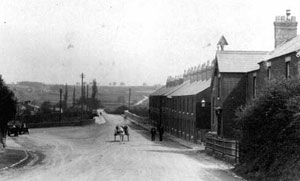
Frodsham Bridge
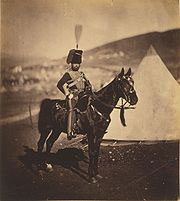 The hussars played a prominent role as cavalry in the Napoleonic Wars (1796-1815). As light cavalrymen mounted on fast horses, they would be used to fight skirmish battles and for scouting. Most of the great European powers raised hussar regiments. The armies of France, Austria, Prussia, and Russia had included hussar regiments since the mid-18th century. In the case of Britain four light dragoon regiments were converted to hussars in 1805. Hussars were notoriously impetuous, and Napoleon was quoted as stating that he would be surprised for a hussar to live beyond the age of thirty due to their tendency to become reckless in battle, exposing their weaknesses in frontal assaults. The hussars of Napoleon created the tradition of sabrage, the opening of a champagne bottle with a saber.
The hussars played a prominent role as cavalry in the Napoleonic Wars (1796-1815). As light cavalrymen mounted on fast horses, they would be used to fight skirmish battles and for scouting. Most of the great European powers raised hussar regiments. The armies of France, Austria, Prussia, and Russia had included hussar regiments since the mid-18th century. In the case of Britain four light dragoon regiments were converted to hussars in 1805. Hussars were notoriously impetuous, and Napoleon was quoted as stating that he would be surprised for a hussar to live beyond the age of thirty due to their tendency to become reckless in battle, exposing their weaknesses in frontal assaults. The hussars of Napoleon created the tradition of sabrage, the opening of a champagne bottle with a saber.
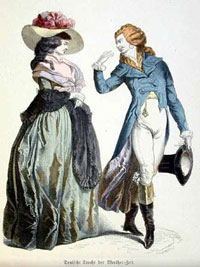
A well dressed couple in England in the late 1700’s.
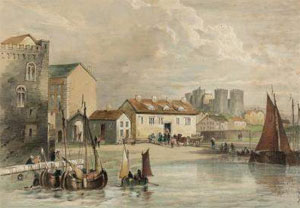
Liverpool in the early 1800’s
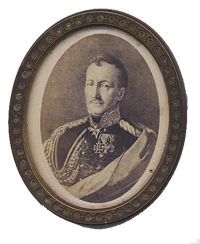
Colonel von Kamecke
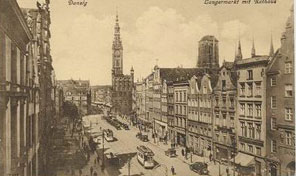
Long Market, Danzig, Prussia
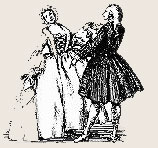 English Country Dance is the dance form that was popular in England and America in the 1600’s, 1700’s and early 1800’s. It is one of the dance forms from which modern contra and square dance are descended.
English Country Dance is the dance form that was popular in England and America in the 1600’s, 1700’s and early 1800’s. It is one of the dance forms from which modern contra and square dance are descended.
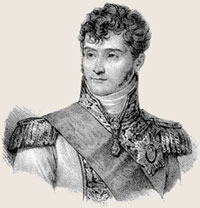
Jerome Bonaparte [1784-1860]
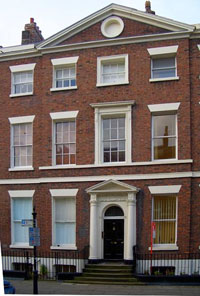
62 Rodney Street, Liverpool, birthplace of William Ewart Gladstone (1809-1898), son of Sir John Gladstone. In earlier times, not only the Gladstones but also many other notables lived here.
John and Robert Gladstone
“…in 1818. At this time John and Robert Gladstone had six ships licensed for the Indian trade.
In 1821 John Gladstone quarrelled with his brother Robert. A rumor had been set afloat in Liverpool that John and Robert Gladstone were in difficulties and needed the support of a loan. It was not in John ever, under any circumstances, to forgive those who had spoken thus of him. Robert on the other hand tried to bring about a reconciliation with the offender. His preliminary peacemaking moves came to his brother’s ears. John at once broke up the partnership. The assets including the ships were divided between them. Robert formed a new East India concern of his own. A new firm, that of John Gladstone and Co., was formed to do the East India business; in this Gladsone had #30,000.
Finally in 1821 John Gladstone’s East and West Indian companies were merged in Gladstone, Grant and Wilson.
Robert was not a [in]considerable merchant in his own right, chairman of the Liverpool East India Association.” – The Gladstones A Family Biography 1746-1851, S.G. Checkland, Cambridge University Press, 1971
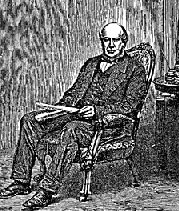
Sir John Gladstone
Muggau, Danzig
1818-1821 (age 33-36)
“The years from 28th April 1818 till 1821, my time passed in the usual routine of Mercantile Businesses. I being in the possession of three hundred and Fifty Lasts of Wheat (about twenty thousand imperial or winchest measures) laying in Danzig and my Brother William as Pickering Brothers of Liverpool possessed about the same quantity of Wheat but laying in Bond or under the Kings Lock; (which played a very singular roll betwixt my Brother and the Duke of Wellington, as the sequell of this wil shew) as at time the [standing] seal Duty on all description of Corn existed in England
“Judging I could not sell my stock of Wheat to advantage probably for a many years, the prices thereof had fallen so extremely low every where and I, as Commission and general Merchant suffering very heavy the loss of all Interest on my Capital, as also the loss of all Warehouse Rent and working changes to keep it in good condition, until I could dispose of the same without suffering too severly
“Seeing how I was situated and being determined not to remain idle, probably for a many years;
“I consulted with Wife; and utlimately determined not to sit Idle; living upon our Capital but, having no Income.
“I therefore bought the Village and Estate of Muggau; (one thousand seven hundred statute Acres of Land) but so near to Danzig that its boundry joined the Fortifications of Danzig; so that I could attend to my farming pursuits also to my Mercantile Affairs, reciprocally; as I possessed a very good dwelling House in Danzig; as also about twenty acres statue measure, of the best meadow Land, in Fair Water; the Shipping Port of Danzig, adjacent to the Sasper Sea. Which Napolean the 1st designed to transform into a Wet Dock; and which later in Napolean the 3rd Reign was effected.
“As I saw the immence advantage of such a Dock, and particularly if it could also be joined with a Dry Dock wherin to repair Ships, without loss of time as the Baltic has no Ebbe and Flood to, not only Danzigs commerce but to the safety of Danzig as a Fortification and indeed to the safeguard of the Prussian Monarchy; as in my opinion that Power that possess, and can maintain the possession of the Fortifications of Danzig, would also govern the Destiny of Prussia Ultimately; owing to the peculiarity of the locallities surrounding Danzig; in being able to lay the Danzig; Elbing and Marienburger Wenders, a many feet deep under water, so that in reallity Danzig could only be approachable over the heights of Altdorf, Wonneberg, Sulmin, Muggau and Zigankenberg as distance of not more than three English miles; and owing to their high range of position; unconqurable. I wrote to the Crown Princess of Prussia as Gemahlin, Crown Princess Victoria of England, that the premeditated Sasper Dock, should be so constructed that it could serve both as a wet as a Dry Dock; by means of the Radoun Stream, which as it lays twenty six feet higher than the Water in the Towns Trenches at the ….. Thor, nothing could be easier than conducting the Radoun Stream in part from the Lossmuss through an underground Tunnel or Kast Iron Pipes, under the projected vail Road, into the wet and dry docks at Fairwater, by which means the Water in said Docks would rise about twenty six feet high and suffieintly deep for a eighty four gun ship of War.
“To which application Her Royal Highness answered me through Her Royal Highnesses Secretary Baron Stokmer, Her Royal Highness had received my Letter of … that Her Royal Highness never interfered with matters of State but had ordered me Baron Stokmer to inform you, to apply to Minister von den Heidt, for instructions on the subject; which I immediately did; but no reply being made to me from Minister Heidt, for several weeks; I felt myself neglected; and consiquently I applied to Lord John Russel, the Secretary of State for Foreign Affairs in London; and in ten Days, I received a suitable answer, from Minister Heidt; saying, under present circumstances, and the Finances of the State; my proposition could not be complyed with.
“Yet a many months later; an Officer applied personally to me in the name of the Prussian Government for a full explination on the subject of the Sasper Sea Dock, to which applicant I answered, I had been so neglected by Minister Heidt; and that I only received a reply from Minister on the subject, on my having informed Lord John Russel Secretary of State for Foreign Affairs in London, how Minister Heidt had conducted himself, on my application to Her Royal Highnesses Private Secretary Baron Stokmer; I was necessiated to decline any further explination on the subject till I knew how I should be renumerated for any explination.”
… unfortuantely this is the end of Peter’s wonderful journal [CPS]
Muggau Manor, drawn by Peter’s first daughter, Marie Pauline Pickering. She was a renowned artist of her time. Two sketchbooks exists described as: “89 and 42 leaves with ~ 140 image-wise executed, some double-page pen and pencil drawings, this mostly watercolors, mostly titled and mostly dated, mainly seascapes and vistas of the island of Usedom Heringsdorf and Ahlbeck and resin scenery and views to Gdansk, sheet size up 24 x 16.5 cm, 1878-1885 4501 Many of the finely executed drawings showing views of the seaside resort Heringsdorf and Ahlbeck with palatial villas and beach games, the exact labels can be localized to the views and give an impression of this rare seaside resorts to frühwilheminischen time Marie Pauline Pickering was the second child of Mr and Mrs Peter Pickering (1785 – 1865) and Emilie Henriette Steffens (1794 – 1877), born Peter Pickering came from a distinguished English artist Dynasty and Emilie Henriette came from the significant and rich Danzig merchant family Steffens (Steffen house Gdansk), 1822 the family moved to the estate Müggau in Gdansk.”
Ref: http://www.beyars.com/partner-objekt_265111_pickering-marie-pauline-danzig-1820-1901-danzig-.html

